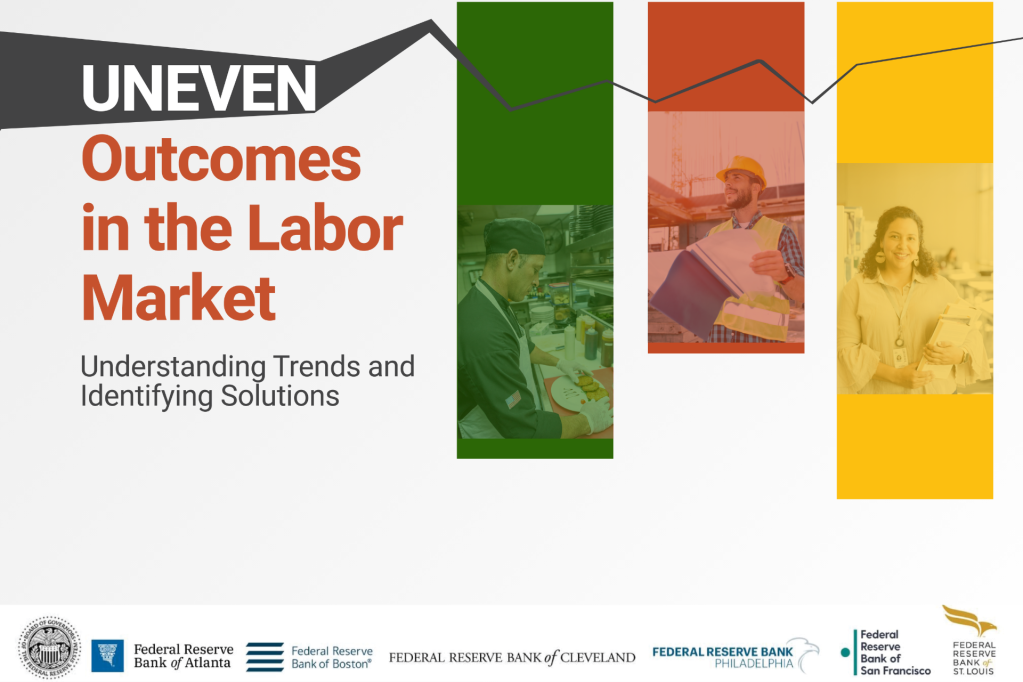Day 3: Who’s Minding the Store? Firm-Level Characteristics and Worker Outcomes
Listen to the podcast
WATCH ON DEMAND
Uneven Outcomes in the Labor Market: Understanding Trends and Identifying Solutions: Who’s Minding the Store? Firm-Level Characteristics and Worker Outcomes, February 7, 2024 (video, 1:22:41). Open transcript in new window.
The relationship between employer characteristics and job quality is not well understood. This seminar, presented by the Federal Reserve Board of Governors and the Federal Reserve Banks of Atlanta, Boston, Cleveland, Philadelphia, San Francisco, and St. Louis on February 7, 2024 gathered experts to discuss how employer structure and financing may affect worker compensation and other job characteristics.
Speakers

Michelle Bowman
Governor
Federal Reserve Board of Governors
Principal

Sara Chaganti
Deputy Director, Community Development Research Regional & Community Outreach
Federal Reserve Bank of Boston

Andrew Joung
PhD Candidate
University of Michigan

Wenting Ma
Assistant Professor of Finance
University of Massachusetts, Amherst

Paige Ouimet
Professor of Finance & Associate Dean of the PhD Program and Executive Director of the Kenan Institute of Private Enterprise
University of North Carolina

Adria Scharf
Associate Director, Institute for Study of Employee Ownership and Profit Sharing
Rutgers School of Management and Labor Relations
Discussant

Douglas A. Webber
Senior Economist
Federal Reserve Board of Governors

Nathan Wilmers
Associate Professor
MIT Sloan School of Management
Discussion framer

Agenda
Welcome
Sara Chaganti
Deputy Director, Community Development Research Regional & Community Outreach
Federal Reserve Bank of Boston
Opening Remarks
Michelle Bowman
Governor
Federal Reserve Board of Governors
(pre-recorded)
Day’s Framing
Download presentation slides (pdf, 801 KB)
Nathan Wilmers
Associate Professor
MIT Sloan School of Management
Firms with Benefits? Nonwage Compensation and Implications for Firms and Labor Markets
Download presentation slides (pdf, 272 KB)
Presenter: Paige Ouimet
Professor of Finance & Associate Dean of the PhD Program and Executive Director of the Kenan Institute of Private Enterprise
University of North Carolina
Access to Financing and Racial Pay Gap Inside Firms
Download presentation slides (pdf, 505 KB)
Presenter: Wenting Ma
Assistant Professor of Finance
University of Massachusetts Amherst
Opening the Black Box of Self-Employment: Identifying Alternative Work Arrangements in the United States
Download presentation slides (pdf, 267 KB)
Presenter: Andrew Joung
PhD Candidate
Institute for Social Research, University of Michigan
Discussant and Q&A
Adria Scharf
Associate Director, Institute for Study of Employee Ownership and Profit Sharing
Rutgers School of Management and Labor Relations
Geographic Inequality and Labor Market Indicators
Download presentation slides (pdf, 619 KB)
Douglas A. Webber
Senior Economist
Federal Reserve Board of Governors
Closing remarks
About the Series
In 2024, community development staff from the Federal Reserve Board of Governors and the Federal Reserve Banks of Atlanta, Boston, Cleveland, Philadelphia, San Francisco, and St. Louis hosted, Uneven Outcomes in the Labor Market: Understanding Trends and Identifying Solutions. The conference convened a diverse network of researchers, policymakers, and practitioners to examine inequities in labor market outcomes and explore the implications of disparities on aggregate economic performance, individual workers, and communities. They also discuss new directions for policy and research.
Understanding employment conditions requires evidence from a wide spectrum of sources. To this end, the Federal Reserve is interested in highlighting research that examines disparities in employment, labor force participation, income, and wealth across demographic groups. Analyzing disparate outcomes can inform policy that identify those who are excluded from the mainstream economy and suggests pathways for inclusion.






